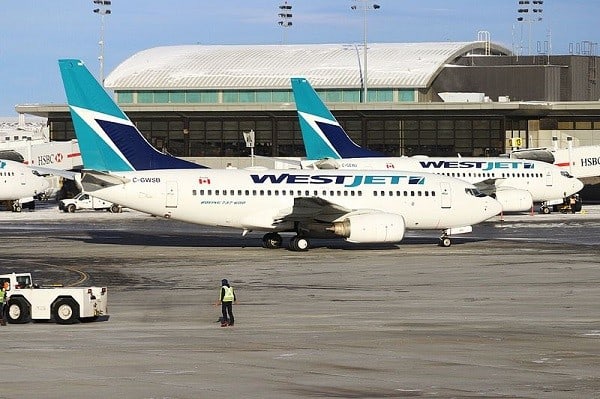WestJet stock: now’s not a bad time to be buying, says Paul Gardner

 The turmoil in the skies continues this week as both Air Canada and WestJet (WestJet Stock Quote, Chart TSX:WJA) announced the suspension of their 2019 financial forecasts in the wake of the grounding of Boeing 737 Max 8 planes worldwide.
The turmoil in the skies continues this week as both Air Canada and WestJet (WestJet Stock Quote, Chart TSX:WJA) announced the suspension of their 2019 financial forecasts in the wake of the grounding of Boeing 737 Max 8 planes worldwide.
And while their fortunes may have differed over the past while —with Air Canada completing an admirable turnaround while WestJet has been dealing with union troubles and a change in leadership— there still might be value in picking up WestJet, says Paul Gardner of Avenue Investment, who advises that trading airlines is not for the faint of heart.
On Monday, WestJet joined Air Canada in suspending its 2019 forecast following a fatal plane crash in Ethiopia, the second involving a Boeing 737 Max 8 in five months. WestJet said that its 2020-2022 projections would remain intact, as the airline scrambles to accommodate the grounding of its 13 Max 8 jets.
“WestJet continues to implement and execute its contingency plan to minimize guest disruption and any financial impact,” said the company in a statement.
WestJet’s share price, which had already been on a downward slope over the past month, fell further this week, dropping from a high of $21.85 in early February to where it now sits at $18.96 as of early morning trading on Thursday.
The divergent paths of Canada’s top two airlines is written in their stock charts, with AC gaining 27 per cent since the start of 2018 while WestJet has fallen 28 per cent over the same period.
But Gardner says WestJet could be rounding a corner.
“They had a couple of weak quarters, but on the last quarter before the Boeing thing, they came out with guidance that was good and their numbers were good,” says Gardner, to BNN Bloomberg Wednesday.
“We’re not in love with the airline space but our proxy was Air Canada because management restructured everything. They got their debt down to next to nothing, they’re signing ten-year contracts for their employees and it’s now gushing a tonne of free cash flow. So it has turned into a better discipline,” he says.
For its last quarter, reported in early February, WestJet matched analysts’ forecasts on its revenue, which at $1.19 billion was up seven per cent year-over-year, while its net earnings fell by 39 per cent compared to a year prior, which the company attributed to rising fuel costs.
Gardner says that owning stock in airlines is always a risky venture due to the impact of external factors on the business.
“Airlines are [traditionally] very bad with pricing and discipline and with seats but now [Air Canada] is very good, so we like it better than WestJet,” he says. “But as long as you’re expecting a little bit of volatility from the share price and from the economy, it’s probably not a bad entry point [for WestJet].”
“But be very careful. Know a buy spot and know a sell spot, don’t get emotional. In recessions, these things get hit hard. If oil prices go up to $80 or $90, they’ll get hit hard. And you have labour problems, too,” he said.


